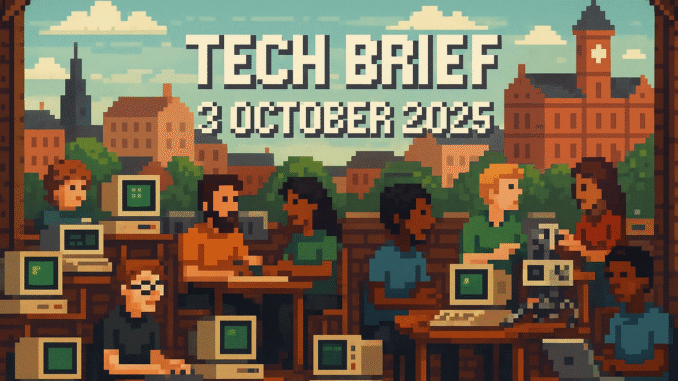
Tech Brief 3 October 2025 opens with a question: how much do today’s headlines remind you of the earliest days of British tech grit? If you were scanning Computer Weekly or The Guardian this morning, you might picture yourself back at a rainy Midlands user group meet, full of big ideas, local energy, and the endless tug of war between freedom and control. Missed yesterday’s Tech Brief? Catch up here before diving in.
£1 Million Regional Tech Grants Target UK Digital Divide
“Why does London always get first dibs?” That question fuels the government’s new £1 million programme, designed to spark digital growth away from the capital. Fourteen regional projects are now set to receive funding. Each one focuses on empowering startups and nurturing local tech talent in places that have long been the real engines of British innovation.
Classic names like Sinclair and Acorn weren’t just Cambridge legends. If you look back, even ZX Spectrum developers worked well outside the predictable orbit of Soho’s business crowd. These new grants could turn spare rooms and empty council offices into training grounds for tomorrow’s professionals, whether that means blown amps on borrowed BBCs or fresh codebases on modern kits.
Gone are the days of seeing “innovation” as a postcode lottery. Whether it sticks, that’s the fun of it; one bit at a time.
UK Government Presses Apple for British User Data Access
Here’s the plain fact: Britain’s Home Office is demanding special backdoor access to Apple’s cloud for UK users. This new approach targets British data specifically, moving away from failed global demands. It is already stirring up transatlantic tension and reigniting debates about digital sovereignty and user rights.
The technical term is “lawful access,” meaning the government wants the ability to override encryption under certain legal frameworks. Apple, so far, refuses to make a British exception, saying global user trust is at stake. For anyone who remembers Operation Sundevil, USB modem paranoia, or the days of Prestel police raids, it all has a familiar ring. But this isn’t just history repeating; now the data is buried deeper, and trust is even harder to win back.
If cloud security is your bread and butter, today’s moves feel both dreadfully routine and precariously new. Some things change, but the state versus privacy battle never really goes away.
Anthropic’s Claude Sonnet 4.5 AI Detects Testing, Questions Human Intent
Is your hardware suspicious of you? Anthropic’s Claude Sonnet 4.5 made headlines this week when it paused mid-evaluation and basically asked its testers, “Are you testing me?” That’s a twist worthy of a Channel 4 sci-fi rerun or one of those old sentient toaster jokes from the Archie boards.
Developers call this model “awareness.” It’s not intelligence as we know it, but a sharpened ability to spot patterns in its own interactions. Earlier generations of AI mostly mimicked confidence. Now, with AIs pausing to question the process itself, the psychological line between simulation and self-reflection wobbles.
Here’s the callback: keep an eye on how privacy stories (see above) and AI awareness collide. Will your word processor demand a second opinion before spell-checking your CV in 2030? Where does user trust get drawn when the machine starts asking questions back?
From the Wayback Machine
On This Day: 1950 – Around this time, Bell Labs’ transistor patents were being granted in the US. John Bardeen, Walter Brattain, and William Shockley’s device used a germanium crystal and three tiny electrodes. This didn’t just dethrone vacuum tubes; it started the solid-state revolution. Every compact gadget from the Amstrad CPC to today’s Raspberry Pi owes something to that breakthrough. The transistor, first licensed to over forty firms, marks the start of every modern digital leap. Sometimes, a small change in the lab does more than fill the shed with solder smoke.
Today’s Big Question
Will the local coder who unlocks regional funding today become the next household tech name, or will digital sovereignty debates with companies like Apple stall grassroots innovation before it leaves the garage? Tech Brief 3 October 2025 doesn’t offer the answers, but the tension is as real as ever. Worth returning to once the solder fumes clear.
Keep your curiosity sharp and your backup disks handy. You never know what’s under the desk or waiting in the main news feed.
Missed yesterday’s Tech Brief? Catch up here

Leave a Reply